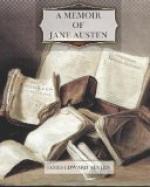The patten now supports each frugal
dame,
Which from the blue-eyed Patty takes
the name.
But mortal damsels have long ago discarded the clumsy implement. First it dropped its iron ring and became a clog; afterwards it was fined down into the pliant galoshe—lighter to wear and more effectual to protect—a no less manifest instance of gradual improvement than Cowper indicates when he traces through eighty lines of poetry his ‘accomplished sofa’ back to the original three-legged stool.
As an illustration of the purposes which a patten was intended to serve, I add the following epigram, written by Jane Austen’s uncle, Mr. Leigh Perrot, on reading in a newspaper the marriage of Captain Foote to Miss Patten:—
Through the rough paths of life,
with a patten your guard,
May you safely
and pleasantly jog;
May the knot never slip, nor the
ring press too hard,
Nor the Foot
find the Patten a clog.
At the time when Jane Austen lived at Steventon, a work was carried on in the neighbouring cottages which ought to be recorded, because it has long ceased to exist.
Up to the beginning of the present century, poor women found profitable employment in spinning flax or wool. This was a better occupation for them than straw plaiting, inasmuch as it was carried on at the family hearth, and did not admit of gadding and gossiping about the village. The implement used was a long narrow machine of wood, raised on legs, furnished at one end with a large wheel, and at the other with a spindle on which the flax or wool was loosely wrapped, connected together by a loop of string. One hand turned the wheel, while the other formed the thread. The outstretched arms, the advanced foot, the sway of the whole figure backwards and forwards,




